The political transition in Libya is facing numerous challenges, two years after the fall of Muammar Gaddafi, a UN envoy said Tuesday.
"A combination of internal and regional dynamics continues to place a huge strain on the political process taking place in the country," United Nations Special Representative in Libya, Tarek Mitri, said in his six-monthly briefing to the UN Security Council.
In his six-page report, Mitri noted that disagreements among political forces inside the General National Congress (GNC) and the government had led to the polarization of political spectrum as well as a widespread sense of skepticism in Libya.
Mitri expressed concerns about recent escalation of clan violence, and the murdering of security officers, judges and journalists, adding that "progress in integrating revolutionary fighters into the police and the Libyan army remains very limited, as is their integration into civilian life."
"It is more evident today that pre-convinced ideas about political transition are likely to be a recipe for disappointment, if not failure," Mitri cautioned.
However, he spoke about some positive steps achieved in Libya, such as the GNC's adoption of a law for the election of a Constitution Drafting Assembly, and measures for better representation of women as well as cultural and ethnic minorities in the Assembly.
Mitri stressed the urgency of a national dialogue to defuse tensions and ensure respect for the democratic process in Libya, noting that the United Nations is involved in activities in support of national education and public awareness of constitutional issues, mainly focusing on the electoral process, human rights, transitional justice and the rule of law.
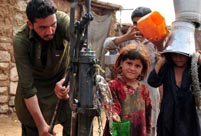 Pakistan suffers desperate shortage of water
Pakistan suffers desperate shortage of water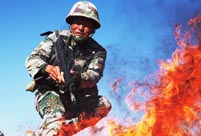 Lanzhou MAC conducts actual-troop live-ammunition drill
Lanzhou MAC conducts actual-troop live-ammunition drill Heritage train ride across western Kosovo
Heritage train ride across western Kosovo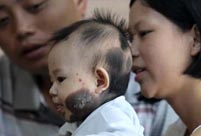 Baby girl 'too young' for birthmarks treatment
Baby girl 'too young' for birthmarks treatment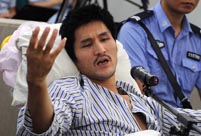 Beijing court hears airport blast case
Beijing court hears airport blast case Harbin named Chinese city with most beautiful women
Harbin named Chinese city with most beautiful women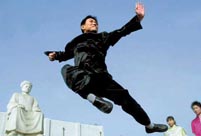 Wushu spirit
Wushu spirit Rugby girls
Rugby girls Funniest photos of sport stars as kids
Funniest photos of sport stars as kids  Residences of the royal house of Savoy
Residences of the royal house of Savoy China's frigate 'Bengbu'in fire training
China's frigate 'Bengbu'in fire training The last days of Wan Aihua
The last days of Wan Aihua Highlights at 12th National Games of China
Highlights at 12th National Games of China Beijing Film Academy welcomes freshmen
Beijing Film Academy welcomes freshmen 2013 Taiwan Int'l Tourism Expo kicks off in Taipei
2013 Taiwan Int'l Tourism Expo kicks off in TaipeiDay|Week|Month